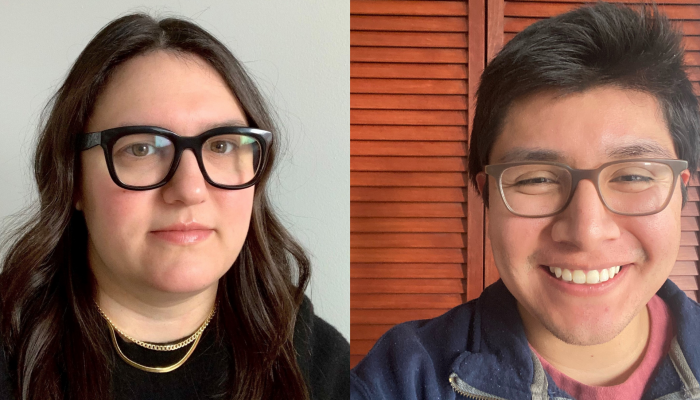Zoe Soslow (l) and Khristian Monterroso (r) are members the OD Stat fatality review team, a program of the City’s Substance Use Prevention and Harm Reduction program.
We hear a lot about the thousands of people who die from opioid overdoses every year. It’s easy to get caught up in the big numbers and lose sight of the individual, unique lives stolen by the epidemic.
OD Stat, the City’s overdose fatality review team, does just the opposite. As part of the Substance Use and Harm Reduction program, the team investigates a sampling of these lives and deaths, honoring individuals lost while learning what they can to prevent future fatalities.
The team holds meetings every three months to discuss the circumstances of four to five Philadelphia residents who died from drug overdose, as well as their interactions with City systems, which include:
- Prisons
- Arrests
- Homeless services
- Substance use treatment
- Behavioral health services
- Infectious disease testing
- Emergency medical services
OD Stat also receives data from community-based organizations, hospitals, and interviews with next-of-kin of decedents (decedents are individuals who died from overdose). The OD Stat team uses this information to write a fully de-identified summary about the individual’s life and the circumstances of their death.
Honoring the complexity of a life
“Our goal is to review these cases in a holistic way that honors the complexity of their lives,” says Zoe Soslow, central administrator for OD Stat. “The overdose crisis is often described using statistics and we hope to highlight the lives that were lost in a personal way.”
“We have a lot to learn from those who have lost their lives to overdose,” adds Khristian Monterroso, project associate for OD Stat. “We aim to use these learnings to create or change policy, programs, or changes to laws that will prevent future overdoses and keep people as healthy as possible.”
City collaboration and community partnership
The OD Stat process involves two groups of people. The OD Stat staff group is comprised of employees from Philadelphia’s Department of Public Health and Department of Behavioral Health and Intellectual disAbility Services. This group reviews the details of overdose fatalities and consolidates the information presented at quarterly meetings.
The larger OD Stat team, chaired by Managing Director Tumar Alexander, attends the quarterly meetings to hear the individuals’ stories and discuss areas for improvement in services or missed opportunities that might have prevented the death. This team includes City leadership as well as non-City representation from hospitals, community-based organizations, treatment providers, and community members.
Case Study: “Judith”
In mid-2020, the OD Stat team reviewed the case of “Judith,” a Black woman in her late 50s who had been in methadone treatment for decades before her fatal overdose. Judith experienced severe trauma throughout her life, beginning with the loss of her brother to gun violence in the 1980s, an injury to her son in 2010 due to gun violence, and the loss of her brother in the week leading up to her death.
“Judith” left methadone treatment a few years before her death, and as a result, she lost access to support and resources. She overdosed several times either in her home or friends’ homes before her death. Several recommendations were made after reviewing Judith’s case, including:
- Provide individuals who leave methadone treatment with community-based resources that offer support during the transition out of treatment.
- Create a campaign that educates the public about a) the risks of overdose in the home and b) how to use naloxone, a medication that rapidly reverses the effects of an opioid overdose.
- Propose that the Philadelphia Fire Department/EMS provide naloxone to any individual who uses drugs, regardless of whether they use opioids or have experienced an overdose, in addition to education about widespread fentanyl contamination in other drugs or counterfeit prescription pills.
Grief and “meaning-making”
The OD Stat team works with two bereavement care providers who provide grief counseling and conduct interviews with the decedent’s next-of-kin. These interviews provide important, personal information about their loved one’s lives that are invaluable to the review process.
Bereavement care provider Laura Vargas emphasizes the benefits of the interviews for the family. “Complex grief often follows overdose deaths, and it takes time to process and understand these events. This is called meaning-making. I’ve found that the OD Stat interview process allows families to share their stories while also making meaning out of them.”
Laura’s training as a grief counselor has enabled her team to provide crucial support throughout the interview process and allows families to feel safe and secure sharing their difficult stories. Several individuals who worked with Laura throughout the OD Stat process have become ongoing clients for grief counseling and/or the support groups. The City of Philadelphia offers these services at no cost to the family.
Laura describes “the comfort that comes to many families when they learn there is a team who cares and recognizes that each victim of the overdose epidemic has a group of people who love them, are grieving them, and do not want this to happen to other families.”



